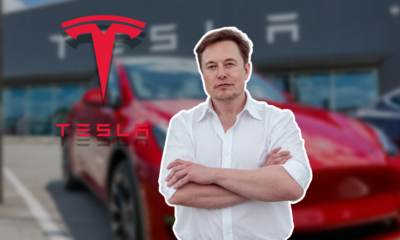Published
1 year agoon

The Sajjan Jindal-led JSW Group is accelerating its entry into the electric vehicle (EV) space, with plans to launch electric cars and e-trucks under its own brand. In a bid to power this ambitious venture, the conglomerate is reportedly in talks with multiple potential partners, including Chinese automotive heavyweights Geely and BYD.
JSW Group’s EV initiative will be spearheaded by JSW Green Mobility, a newly formed entity. The group is exploring collaborations that could include licensing agreements or technology transfers to build a comprehensive mobility company. These efforts are distinct from its existing joint venture with China’s SAIC Motor, JSW MG Motor India, which will operate independently while leveraging synergies with JSW Green Mobility.
High Ambitions Backed by Strategic Planning
JSW’s EV aspirations are not new. Initial discussions around its EV plans surfaced in 2017, but the group has since refined its strategy. It has now identified platforms—two each for electric cars and commercial vehicles—as part of its EV roadmap. The group aims to finalize the nature and scope of its collaborations by 2025, according to sources familiar with the matter.
Mega Investment in Maharashtra
As part of its EV vision, JSW Green Mobility has committed ₹27,200 crore to establish a manufacturing hub in Chhatrapati Sambhajinagar, Maharashtra. The facility will have an annual production capacity of 500,000 electric cars and 100,000 commercial vehicles, making it one of the largest EV investments in India. This project was among seven approved by the Maharashtra state cabinet in September 2024.
To steer this ambitious venture, JSW has brought in industry veterans. Rajiv Mehta has been appointed as the chief of business, while Manoj Surana, a senior executive from electric bus maker Olectra Greentech, has joined as the head of homologation and technical operations.
Tapping Into a Growing Market
India’s EV market is on a growth trajectory, driven by electric two- and three-wheelers. The market reached 1.87 million units in the first 11 months of 2024 and is expected to close the year near the 2-million mark. By leveraging partnerships with global players like Geely and BYD—JSW aims to capture a significant share of this growing market.
Geely and BYD. Strategic Collaborators
Geely, which owns Volvo Cars and has a stake in Lotus Cars, already has an indirect presence in India through these premium brands. Meanwhile, BYD has a direct foothold in India’s EV market and could bring its advanced technology to the table, complementing JSW’s manufacturing and market expertise.
While the group’s joint venture with China’s SAIC Motor—JSW MG Motor India—remains a cornerstone of its auto ambitions, sources suggest that JSW is exploring collaborations with other global automakers.

Expanding Beyond SAIC
Industry insiders point to the non-exclusive nature of the JSW-SAIC partnership as a key driver for JSW’s exploration of additional alliances. “The SAIC-JSW partnership allows JSW to pursue other collaborations, depending on the vehicle segments it wishes to target,” said a senior auto executive.
A potential sticking point in the SAIC partnership is the lack of majority ownership for JSW. Currently, JSW holds a 35% stake in JSW MG Motor India, while SAIC retains 49%. The remaining shares are split between private equity firm Everstone Capital (8%) and MG dealers and employees (8%). Although there have been reports of JSW seeking to increase its stake to 51% ahead of a potential IPO, the company has yet to confirm this development.
JSW’s pursuit of partnerships isn’t new. In 2023, the group was in advanced talks with Ford to acquire its manufacturing facilities in India, but the negotiations fell through. More recently, there have been reports of discussions with Volkswagen, although these too remain unconfirmed.
The group’s latest focus on Chinese giants Geely and BYD reflects its ambition to leverage cutting-edge EV technology and global expertise. While Geely lacks a direct presence in India, its ownership of Volvo Cars provides it with an indirect foothold. BYD, on the other hand, already operates in India’s EV market, positioning it as a valuable partner for JSW’s EV aspirations.
However, partnerships with Chinese automakers come with regulatory hurdles. India’s FDI policy mandates prior government approval for investments from Chinese entities, including those with Chinese beneficial ownership. Introduced through Press Note 3 of 2020, this policy aims to ensure security clearance for investments in sensitive sectors, will likely shape JSW’s potential collaborations with Geely or BYD.
The Last Bit
JSW Group’s aggressive moves in the auto sector reflect its vision of transforming into a major player in the global automotive sector, particularly in electric vehicles. Whether through strengthening its existing partnerships or forging new ones, the group is setting the stage for a future where innovation, collaboration, and adaptability will define its success.
While its partnership with SAIC provides a strong foundation, the group’s openness to exploring additional collaborations signals a desire to diversify its portfolio and tap into different vehicle segments. If successful, JSW’s multi-partnership strategy could position it as a leader in India’s auto industry, capitalizing on both market opportunities and regulatory challenges with strategic finesse.



Shakeup In The Auto Sector. Mercedes-Benz 15% Job Cuts, Nissan CEO Exit, And Germany’s Make-Or-Break Year


Tata Motors Tanks 44%: Is The Worst Over Or More Pain Ahead?


After A Tough Year In China, And Plummeting Sales, Can Tesla’s India Gamble Steer It Back On Track Amid Musk’s Controversies?


The Stock Market’s Cracking—And It’s Not Pretty. FIIs Exodus But Analysts Sight Long Term Potential Despite Rs 32,00,000 Core Investor Wealth Gone In 2025. What Is The Bear-ish Deal Here?


Has The Indian Economy Entered A “Cyclical Growth Slowdown”? And What Does That Mean For The Average Indian?


America Prepares For Trump’s 100 Executive Actions. Is The U.S. Heading Toward Corporate Dictatorship And Will These “Mandates” Lead To Violence And Tension Within America?